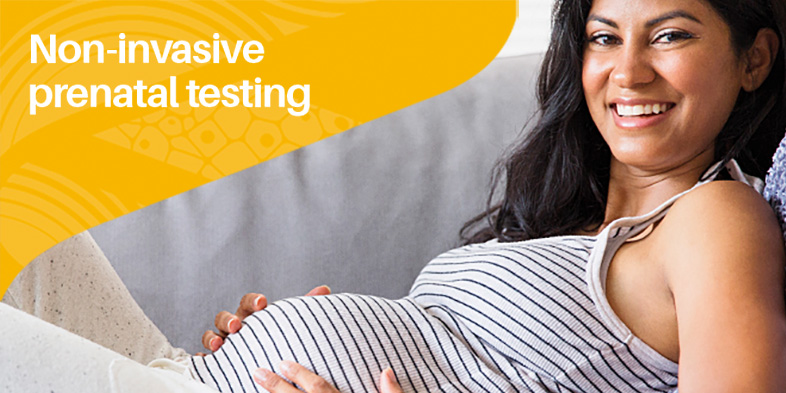Non-invasive prenatal testing
Genetic testing during pregnancy

Non-invasive prenatal testing (NIPT) screens for the presence of specific chromosome disorders in the developing fetus. The test analyses fragments of cell-free DNA in maternal plasma that have been released from both maternal and placental cells.
NIPT requires a single blood draw, which poses no threat to the fetus, and can be done as early as 10 weeks’ gestation. By analysing the proportions of DNA fragments derived from different chromosomes or chromosome regions, NIPT can screen for the presence or absence of specific chromosome disorders.
NIPT is more accurate than first trimester maternal serum screening and ultrasound in identifying pregnancies with or without these disorders.
 About the test
About the test
DNA from the fetus circulates in the mother’s blood. Cell-free DNA (cfDNA) results from the natural breakdown of fetal cells (presumed to be mostly placental) and clears from the maternal system within hours of giving birth.
During a pregnancy, cfDNA can be tested to give the most accurate screening approach in estimating the risk of a fetus having a common chromosome condition sometimes called a trisomy. This occurs when there are three copies of a particular chromosome instead of the expected two. The test looks to detect the following conditions:
- Trisomy 21 is the most common trisomy at the time of birth. Also called Down syndrome, it is associated with moderate to severe intellectual disabilities and may also lead to digestive disease, congenital heart defects and other malformations.
- Trisomy 18 (Edwards syndrome) and Trisomy 13 (Patau syndrome) are associated with a high rate of miscarriage. These babies are born with severe brain abnormalities and often have congenital heart defects as well as other birth defects. Most affected individuals die before or soon after birth, and very few survive beyond the first year of life.
- Sex chromosome conditions occur when there is a missing, extra, or incomplete copy of the X or Y chromosomes. The NIPT test with sex chromosome aneuploidy panel option can assess risk for XXX, XYY, XXY (Klinefelter syndrome), and a missing X chromosome in a girl (Turner syndrome).
In addition, NIPT can assess fetal sex. This is optional (no additional cost).
NIPT does not screen for non-chromosome disorders, familial mutations, malformations, fetal growth or fetal viability.
Risk
The testing is non-invasive: it involves taking a blood sample from the mother. The pregnancy is not put at risk of miscarriage, or from other adverse outcomes that are associated with invasive testing procedures such as amniocentesis.
Accuracy
NIPT provides fewer false-positive and false-negative results than combined first trimester screening for trisomy 21, 18 and 13.
It is important to note that NIPT is a screening test and does not provide a definitive genetic diagnosis, as NIPT cannot differentiate potential chromosome differences between the placenta and fetus. A definitive genetic diagnosis of the fetus requires cytogenetic analysis of either amniotic fluid or chorionic villus sampling (CVS).
|
Combined first trimester screening |
82% | 1 in 26 |
| NIPT | >99% | <1 in 1,000 |
| Accuracy (T21, T18, T13) | Sensitivity* | False-positive rate# |
|---|
* Proportion fetuses with trisomy correctly identified by the test as high probability of disorder.
# Proportion of normal fetuses incorrectly identified by the test as high probability of disorder.
NIPT Performance data in a general screening population
| Trisomy 21 | >99.9% (95% CI:97.1%) | >99.90% (95% CI:99.63%) |
| Trisomy 18 |
>99.9% (95% CI:91.4%) |
>99.90% (99.64% CI:97.1%) |
| Trisomy 13 |
>99.9% (95% CI:87.1%) |
>99.90% (95% CI:99.64%) |
| Detection rate / sensitivity | Specificity |
|---|
 Who can have this test?
Who can have this test?
NIPT can be ordered by healthcare professionals for women with pregnancies of at least10 weeks’ gestational age. This test can be requested for any singleton or twin pregnancy, including those conceived naturally or by IVF using the patient’s own egg or a donor egg.
Note that, in twin pregnancies, sex chromosome (X and Y) analysis can determine fetal sex but not sex chromosome conditions. This test is not suitable in the case of a vanishing twin. The sex of twins will be reported as one result. If male, one or both of the twins will be male. If female, both twins will be female.
The test does not assess risk for mosaicism, partial trisomies or translocations.
Limitations of NIPT
The VeriSeq NIPT Solution v2 is not validated for use in pregnancies with more than two fetuses, fetal demise, mosaicism, partial chromosome aneuploidy, triploidy, translocations, maternal aneuploidy, transplant or malignancy. VeriSeq NIPT Solution v2 does not detect neural tube defects. Certain rare biological conditions may also affect the accuracy of the test.
For twin pregnancies, HIGH PROBABILITY test results apply to at least one fetus; male test results apply to one or both fetuses; female test results apply to both fetuses. Due to the limitations of the test, inaccurate results are possible.
A LOW PROBABILITY result does not guarantee that a fetus is unaffected by a chromosomal or genetic condition. Some non-aneuploid fetuses may have HIGH PROBABILITY results. In cases of HIGH PROBABILITY results and/or other clinical indications of a chromosomal condition, confirmatory testing is necessary for diagnosis.
Results
Results will be ready in approximately 2–4 days. Women still can have their 12-week scan for a detailed examination of the fetal anatomy, including measurement of nuchal translucency, nasal bone and other important factors. In this visit, patients can discuss the DNA and ultrasound results with their obstetricians.
On the basis of the NIPT result and the ultrasound findings, a patient can decide whether or not she wants to have an invasive procedure (for example, CVS or amniocentesis).
The report then summarises the screening assessment for each disorder specified by the requesting doctor (see example below).
Example NIPT report
| Trisomy 21 | High probability |
Genetic counselling and additional testing |
| Trisomy 18 | Low probability <1:10,000 |
Review result with patient |
| Trisomy 13 | Low probability <1:10,000 |
Review result with patient |
|
Sex chromosome aneuploidy |
Not requested | – |
| Fetal sex | Male |
Review result with patient |
| Chromosome | Result | Recommendation |
|---|
A high probability NIPT result should always be confirmed by amniocentesis or CVS before making any decision regarding subsequent management of the pregnancy.
Repeat samples
There needs to be enough fetal DNA in the maternal blood to be able to provide a result. If there is insufficient fetal DNA in the sample (which occurs in 2% of cases), another blood sample from the mother may be required. This will be processed in the laboratory at no extra charge.
If an assessment cannot be provided
On rare occasions, NIPT is unable to provide an assessment of the probability of specific chromosome disorders. This usually reflects the complex biology of genetics and pregnancy, and is not due to a failing in the laboratory.
If NIPT cannot provide a specific assessment after a repeat blood draw, it is not worth repeating the NIPT (unless advised by the laboratory). A decision about other tests (maternal serum screening, detailed ultrasound, amniocentesis or CVS) should be based on the doctor’s assessment of all risk factors identified,and may require specialist consultation.
What is the process?
Once the mother has taken an independent personal decision that she wants to have the NIPT performed, she will be asked to sign a consent form and her blood sample can be taken from a vein in her arm.
Who carries out the analysis of the test?
The mother's sample and completed request form need to be sent to TDL Genetics, where the test is performed on the DNA extracted from her blood sample.
Will the mother need to have any other tests?
NIPT does not provide information on mosaicism, partial trisomies or translocations, or other rare chromosomal abnormalities. If the ultrasound scan shows a high nuchal translucency or other major physical defects such as brain abnormalities, heart abnormalities, the risk for some rare chromosomal defects may be high. In such cases, the mother may choose to have a CVS or an amniocentesis.
The non-invasive prenatal test does not provide information on other physical defects such as spina bifida, or information on fetal growth. It is therefore advisable that the mother has all the usual ultrasound scans during her pregnancy.
Sample stability
Samples must be taken in special tubes provided by the laboratory. These samples must not be refrigerated, but stored at ambient temperature.
Samples must arrive at the laboratory within 5 days of sample collection.
TDL Genetics NIPT Request Form
This is an editable version of the request form for the new TDL Genetics NIPT so you can add the patients’ details electronically. Please save this to your desktop and open it in Adobe Acrobat Reader so it will have full functionality. The dates need to be entered in this format DD/MM/YYYY to work properly or you can use the drop-down calendar option. This can then be printed and signed, barcode label added and sent with the sample as usual.
NIPT testing near me
TDL Genetics non-invasive prenatal test (NIPT) during pregnancy is available across the UK (England, Wales, Scotland, Ireland and Northern Ireland). Click to find out more.
